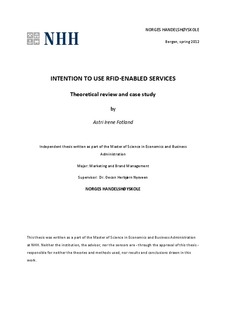Intention to use RFID-enabled services : theoretical review and case study
Master thesis
Permanent lenke
http://hdl.handle.net/11250/169725Utgivelsesdato
2012Metadata
Vis full innførselSamlinger
- Master Thesis [4379]
Sammendrag
This thesis attempts to shed some light over the antecedents of customer’s intention to use Radio Frequency Identification (RFID)-enabled services. Former research has primarily been concerned with the acceptance and implementation of RFID systems in cost-conscious businesses mainly focusing on enhancing efficiency in supply managements or the logistics process. As RFID-technology is increasingly introduced into the world of the consumers, little research has been conducted in the pursuit to understand these intention and adoption processes.
A research model is proposed. Theoretically founded on the Unified Theory of Acceptance and Use of Technology (UTAUT), the model is extended with three additional direct determinants namely; Perceived Risk Harm, Emotions, and Experience. The extension is based on empirical studies and additional affective theories. In addition, situational context and perception of control are selected as moderators. The potential influences of moderating variables have up until now been poorly investigated, and by adding these to the model a more holistic picture of the adoption processes is suggested.
560 independent survey respondents make up the data material from which the conclusions have been drawn. The results indicate that extending UTAUT with the suggested antecedents of intention does not significantly add to the predictive validity of the model, with only experience as an added antecedent posing any influence on intention. Only two UTAUT determinants were reported to exert any significant influence on intention. Performance expectancy (system characteristic) and anxiety (personality trait) were found to be robust determinants of intention unaffected by both situational context and perception of control.
